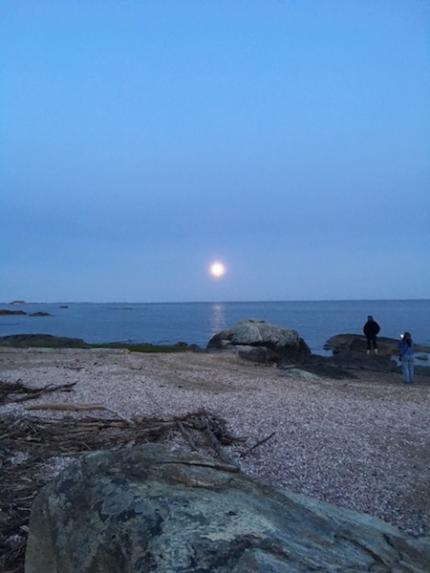
Last month I stood with a circle of sixty people or so on a rocky beach on Long Island Sound and sang up the moon. As the soft full circlet of the moon rose above the water, the coral sun sank in the west. We gazed in awed silence, chanted, recited poetry. The luminosity of the experience was heightened by the occasion: we were on a retreat led by Robin Wall Kimmerer, "Returning the Gift: What Does the Earth Ask of Us?"
In that sacred container woven by Robin's rooted wisdom and her openheartedness, combined with the ceremonies and practices that carried us deeper, the earnestness of the retreatants, and the fulsome hospitality of the place, I was able to peel back another layer of grief and step for a moment into something very near to solace. I slept with the moon shining in my open window and woke to the rhythm of water caressing the shore. I spent time with a scrubby bush clinging to sandy soil and rock, with seashells and a majestic spruce. These not as backdrop, but as Robin called them, "kin".
I was encouraged to see, when looking around the room where we gathered, heads of glossy black hair, and vibrant brown, and even honey blonde sprinkled among the sea of gray and salt and pepper. Whatever forces were at work here, it seemed that in small but potent numbers generations were coming together to learn from one another. In my view, the young ones particularly were inspiring, with their witness to the fire within tempered with an intuitive wisdom and draw to finding and living from a genuine center; they were risking and taking loss, resisting dominant cultural stories, forging community, willing to, as they put it, "leap into the abyss"...together. We sat at lunch, old and young, talking as the dining hall emptied around us, listening, swapping stories and experiences, probing burning questions; a humble but significant throw of the shuttle in the re-weaving of the world: in these times, a shining moment.
Days later, shortly before the beginning of the "Restorying the Heroine's Journey" retreat at Rolling Ridge, a magnificent "three sisters" oak, (with three trunks growing together) came down over the path to the Meditation Shelter. The forest reverberated with the thunder of that fall. Two of the trunks split catastrophically from the third, each falling at almost an exact right angle. The tree had stood tall and stately, but it was not old, as trees measure time. At the base, where the trunks had come together, there was now an opening into darkness, a portal to the underworld.
As we tried to absorb it all, Josh spent a warm, humid evening strenuously and carefully clearing the Meditation Shelter path, "sweating through my chaps". Even after all his efforts, many of the branches and erupted roots remained around and near the path. During the opening of the retreat, I had to tell the women the story of fallen oak and urge caution when walking that stretch of the path. While safety was the presenting reason, the real substance of the tale was sorrow. So much in this "climate moment" is about implacable loss and death. Fallen oak was one with it.
But then something loosened. As the retreat went on, many of the women found their way one by one to that oak and returned with stories of discovery and healing. A conversation was happening within and around and through that fallen and animate tree. In the detritus of grief and decay, new tendrils of being and connection were growing.
In this moment when our kin are cracking and falling, and the dark abyss opens below them and us, it may be that, as Barbara Cecil writes in a May 27 op-ed at truthout.org, our work "is not about saving the world, but in belonging to it more fully."
This is when hope grows beyond glimmering moments and new visions, beyond something we either give up or choose, and becomes the dear and weighty burden of kinship and belonging, "the hardest love we carry." Here is a poem, "Hope and Love", by Jane Hirshfield:
All winter
the blue heron
slept among the horses.
I do not know
the custom of herons,
do not know
if the solitary habit
is their way,
or if he listened for
some missing one -
not knowing even
that was what he did -
in the blowing
sounds in the dark.
I know that
hope is the hardest
love we carry.
He slept
with his long neck
folded, like a letter
put away.